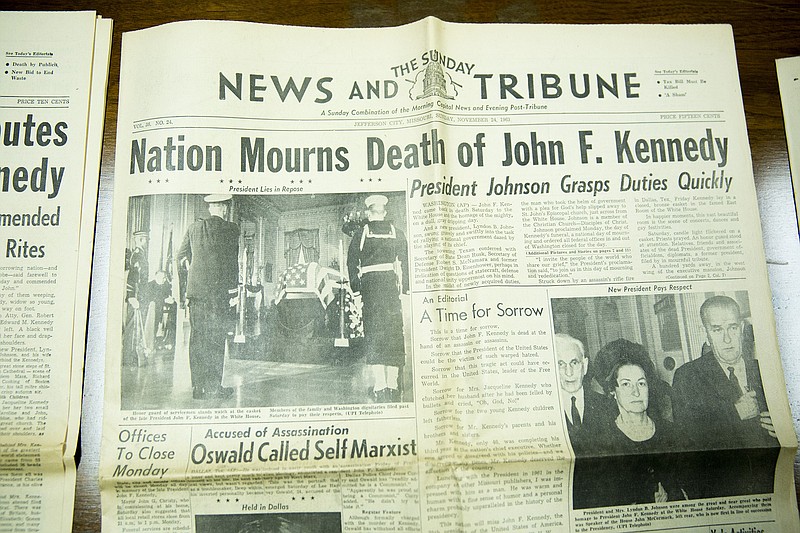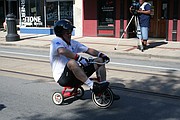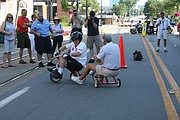If you'd like to share your story about how the assassination of President Kennedy affected you, post your comments in the forum below this article.
_
The assassination of President John F. Kennedy a half-century ago today had a profound effect on our nation. In Jefferson City, it affected different people in different ways, but many of those in our community old enough to remember the killing of the president describe it as a watershed moment in history.
In honor of the anniversary, we asked several prominent and longtime members of the community to tell us where they were at the time, their reaction and how the historic event affected them. Some chose to tell the story in their own words, while others preferred to be interviewed and have us tell their stories.
Lorraine Adkins, community activist
It was the lunch hour, around the time when Lorraine Adkins was feeding her infant, when the announcement was made on her television that Kennedy had been shot. She called a friend, telling her to turn on her TV. "The president has been shot, and they won't tell us anything!" Adkins exclaimed. But her friend wasn't convinced: "What's the punch line?" she asked.
"Our world was pretty good back then," Adkins said. "It was the beginning of tragic episodes in our world. I don't remember things before (that) affecting me like that."
She said today's youths don't have a good sense of that event or any events in U.S. history, which she fears it isn't emphasized enough in schools.
Her husband, Pete, already had been coaching football for several years in Jefferson City. "It really made me frightened, because we were always among crowds at the stadium," Lorraine Adkins said. "I became timid, and I'm not a timid person. It was just a funny feeling that I had. I don't think I even told Petey."
Edith Vogel, former City Council member; part-owner of the local Coca-Cola Bottling Plant
Vogel was sitting in her sixth-grade class at St. Joseph School when school officials made the announcement. The Catholic school had photos of the president - the first and only Catholic president - in almost every room of the school.
And Vogel distinctly recalls that she didn't share the same grief-stricken reaction that her nuns and most of her classmates did. She was being raised in a strong Republican household, where Kennedy's youth and inexperience were a household topic.
"I thought it's just awful, but I didn't react the way I should have," she said. She was 12 at the time, and her initial thought was, "Well, somebody didn't want him to be there."
Still, after prayers and dismissal at school, she followed the events closely on TV with her family over the weekend, and watched the funeral the following Monday. "I was highly impressed with the dignity of the funeral," she said. Since then, she's followed the sagas of the Kennedy family, and still owns numerous books about the family. "I think, "How could a family survive all that tragedy?' But I have to eat crow because, by God, they did it."
Bill Deeken, retired; former county clerk and state representative
Deeken pulled into the parking lot behind Saffees to take his wife back to work at the Sears catalog store, which was near Saffees on High Street at the time. Deeken and his wife had just gone out to lunch. He pulled out of the parking lot to return to his job of filling vending machines, and heard the news on the radio. He immediately drove back to his wife's workplace to break the bad news.
"It just hit you," Deeken said. "It's a shock like you can't believe that the president of the United States would be killed."
At the time, Deeken was a Democrat, but hadn't had the chance to vote for Kennedy because he turned 21 after Kennedy was elected.
During the funeral, he saw Kennedy's children and thought of his own, both of whom were similar in age. "Every time I looked at them at the funeral, I could see my kids," he said. "I just cried like a baby."
As he later pursued a life in public office, he thought back to Kennedy's assassination. As an elected official, "you make people upset sometimes," Deeken said. "And you don't know what's going to happen. It's a different world we're living in now. But you have to go on with what you believe is right, and God will determine what will happen."
Roger Schroeder, Jefferson City police chief
I was 11 years old and sitting in Mr. David Gode's sixth-grade class at Trinity Lutheran School on that Friday afternoon, when the mother of a classmate suddenly appeared in the doorway and quietly asked to speak to Mr. Gode. She had driven to our school to tell us that President Kennedy had been assassinated. I remember the state of confusion and apprehension experienced by all of us. We didn't know what this truly meant to us as individuals or to our country. We obviously knew the tragic nature of the event, yet there wasn't anything to which we could compare or create a context.
My dad, Roy Schroeder, farmed our land located across the railroad tracks from what was then the Algoa Intermediate Reformatory. As I grew older, he also drove our school bus. He had served in World War II and was very stoic by nature. He said little as we turned into our long driveway that late afternoon. I knew he did not politically support President Kennedy, but it was obvious by his demeanor that our country was in the midst of a traumatic event. After we had completed our evening chores, we discovered that details of the assassination and our country's reaction to it dominated the media.
We only received two television channels, and we spent the entire weekend watching CBS News and the trusted Walter Cronkite. I was quickly fascinated and impressed by the ceremonial formalities associated with the death of our president. The honor bestowed upon President Kennedy simultaneously instilled a sense of pride and sadness. I remember asking my dad about the soldiers, who were required to stand at strict attention for what seemed to be the entire weekend. He shared the secret of standing with one's knees slightly flexed to avoid an embarrassing physical collapse.
I firmly believe the events of that weekend instilled in me a deep appreciation of current events, the governing of our country and a sense of patriotic allegiance. The fight for racial equality, anti-war demonstrations, the drug revolution and Vietnam War reporting dominated the country's attention throughout the following 10 years. Most nights at 5:30 p.m. I could be found watching Walter Cronkite. I believe it was during these years of rebellion and strife that my sense of duty was cultivated and eventually manifested in my choice of a law enforcement career.
Randy Allen, president of the Jefferson City Area Chamber of Commerce
I was 10 years old and a fifth-grader at West Elementary school in Jefferson City. We lived on Bolton Drive in a tight-knit neighborhood on the cul-de-sac between Douglas Drive and Forest Hill, off West Main Street.
I can remember it was a normal school day on Friday, Nov. 22, 1963. In the afternoon, I recall our Principal Mr. Myers came into our classroom and told our teacher, Mrs. McClure, and the class that the the president had been shot and killed. I remember the shock and helplessness I felt. President Kennedy was the first president I felt connected to since he was elected when I was only 7. That night, my mom and dad were interested in nothing but the coverage on TV. We had only one black and white television, and two channels. The weekend seemed to be a blur. But I remember on Sunday returning home from church and Sunday school to witness live on TV the killing of Lee Harvey Oswald by Jack Ruby. I will never forget that! That shook us all up. Our neighborhood was very tight knit, and I remember that nearly everyone wanted to be outside talking about it. Many things in my later life would have an impact on me but this one I will remember forever.
Nick Monaco, attorney
On Nov. 22, 1963, my wife, Mildred, and I were in St. Louis because I had a case in the circuit court there that morning. She suggested we have lunch where she might shop at the nearby Stix, Baer and Fuller (The Grand Leader Department Store). We were there on one of the upper floors where many TVs were on display. All of a sudden they were broadcasting the scene at Parkland: The car (convertible) with John Kennedy, Jacqueline Kennedy and the governor of Texas, John Connally, as well as security guards and driver. The audio had been turned up and I heard Walter Cronkite announce that the president had been shot.
We were stunned along with a large gathering in the television display area. I remember being shocked and people gathered there were overcome by the report as it continued that the president was fatally injured. The governor of Texas had also suffered gunshot wounds. Jackie Kennedy was overcome with grief. Shortly thereafter, Mrs. Kennedy had the remarkable courage to stand beside Lyndon Johnson as he was sworn in as president of the United States aboard Air Force One, at the airport in Dallas, Texas. It was a moment in history that will never be forgotten.
Greg White, Cole County sheriff
Nov. 22, 1963, was a day of shock, sorrow, shame and change. I was in sixth grade in Moberly when my principal, Mrs. Mead, spoke quietly to my classroom teacher, Mrs. Headrick. Mrs. Mead then addressed our class and told us President Kennedy had been shot and killed in Dallas, Texas. Individually, and as a class, we were shocked and several students began to cry. What did this mean for us; for our nation?
We learned the suspect in the murder of our president was an American. I was ashamed that we would do this to ourselves. As the funeral came, we mourned our corporate and individual loss.
Having experienced the Cuban Missile Crisis with President Kennedy, I learned one man can change this nation in great ways. Upon his death, and the days following, I learned one very bad man can change this nation for the detriment of us all.
I learned we all bring change for good or bad. My president, even in his untimely death changed my life, and many others, for the better. "The torch has passed."
Related videos:
AP report: 50 Years On, recalling JFK's assassination
Boston Globe editor recalls news coverage of JFK assassination



